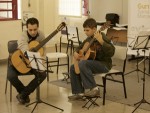Title
I have always dreamed of making a contribution to my native country of Brazil, and during the last days of August I was able to make that dream a reality. I conceived and organized my summer outreach project, Horizontes do Violão (Guitar Horizons), over the span of several months, with the goal of bringing a music education program to students living in poor, underdeveloped areas. Guitar Horizons consisted of a cycle of 10 interactive performances, 10 master classes, 10 presentations on guitar history, and 3 concerts at the facilities of Guri Santa Marcelina (G.S.M.), a program created in 2008 through an initiative of the government of the state of São Paulo. Guitar Horizons was possible through the Juilliard Summer Grant program and a partnership with Guri Santa Marcelina.
Body
G.S.M. is administered by Santa Marcelina, a social-cultural organization whose mission is to offer music education and social inclusion to financially disadvantaged students ages 6 to 18. Through G.S.M., children and teenagers have the opportunity to attend music classes and instrument lessons free of charge. As a result, the G.S.M. students also develop fundamental life skills such as discipline, determination, courage, patience, and self-esteem—all essential parts of the project’s philosophy. As one of the largest music projects in Latin America, the program educates nearly 9,200 students in 20 different locations throughout São Paulo.
As a Brazilian musician, I have always been a great admirer of G.S.M. My project aimed to support G.S.M. through educational activities in six different community centers. I instructed approximately 500 students who lack financial resources and live in the impoverished surrounding areas—essentially shanty towns, known as favelas—of São Paulo. The children are rarely given the opportunity to attend music concerts and festivals, and the proposed activities in Guitar Horizons were developed to enrich and reinforce their learning process. The week and a half-long project served this goal, bringing the fundamentals of a music festival to the G.S.M. students.
After the completion of Guitar Horizons I became aware of how effective the project was in filling the lack of exposure to high-quality music. According to the G.S.M. guitar teacher, Viviane Sarmento, who witnessed the project, “The development of its activities reinforced the subjects we have worked on in class and gave a new perspective to the students.” In fact, after the activities with Sarmento’s class, she was glad to observe a renewed motivation in her students.
In order to fully participate in Guitar Horizons, the students were prepared by the G.S.M. guitar teachers to perform in master classes. I was quite surprised to learn that almost none of the students knew what a master class was. However, it was an even greater surprise to realize the potential of those students. Many of them performed beautifully and responded eagerly to my observations. Instead of being frightened to perform in public, the students were excited to share their playing for the very first time. The students unanimously preferred the master class to all other activities. Interestingly, the master class was the most common and straightforward activity. Its success comes simply from the interaction with each student. Often times correcting a fingering, helping a student shape a phrase, or getting a better tone on the instrument is more valuable than any performance or presentation. That is when the true expansion of the students’ “guitar horizons” took place. I remember having the pleasure to be held several minutes after master classes by students who would not stop asking me questions such as, “How can I shape my nails?” “How many hours do I have to practice?” “When did you start playing the guitar?” “If I start now can I get like you someday?”
The achievement of the project’s goals also became evident when students applauded during concert pieces, because they were excited by certain passages. The warm receptions after each concert were also a proof of its effectiveness. I was asked to sign concert programs and have my picture taken by whole classes of students.
A great moment of the project was the interactive performances, when students played excerpts of my concert repertoire with me. They realized they could also step up and perform like professionals. Each of those collaborative performances aimed to illustrate a specific musical concept, such as polyphony and theme-and-variations form. Through this interaction with the students I was also introducing and developing the concept of interactive performance to Brazilian music educators. Since I practiced interactive performances extensively through The Juilliard School as a McCabe fellow, it was rewarding to be able to bring this innovative approach to Brazil.
Far from the regular concert routine, the entire experience had a huge impact on me. The students’ eagerness to learn, observe details of my playing, listen to every word of my presentations, and personally engage by asking so many questions changed my life. I came to fully understand the true meaning of the word “outreach.” I “reached out” to “reach in” myself. Working with the G.S.M. students made me rediscover the joy of music making. I came to believe that its true value reveals itself only when there is a real opportunity to share.





